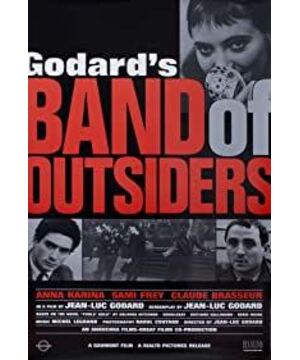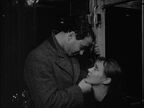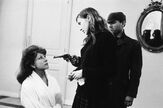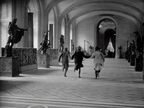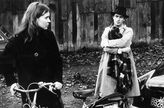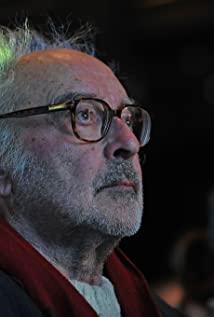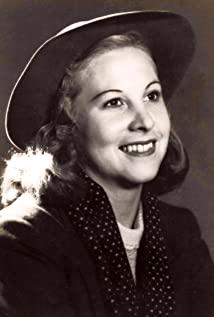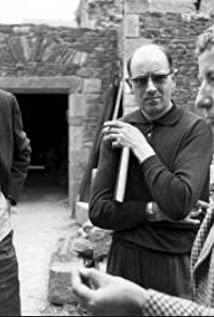There is no need to be a red scholar to appreciate the Dream of Red Mansions. However, it may be more interesting to know some.
In Godard's biography, he was particularly fond of guessing games when he was a child. In the 2017 Varda documentary "Face, Village", Godard left a riddle on the door of his home, which evoked the beautiful and sad memories of Grandma Varda. When Grandma Varda chose a movie at CC headquarters, she said that her favorite Godard movie was "Outside the Law".
Although there are complicated and ambiguous texts (riddles) in "Outside the Law", various texts are quoted from various fields such as film, literature, comics, advertising, politics, art, etc. This is a consistent feature of Godard's movies. , But its audiovisual level is also quite good, with humorous scene design, smooth scene scheduling, relaxed rhythm and colorful Paris style, it can be said that Godard's many "obscure" works can be said to be very good.
riddle
0. At the beginning, it reads: Jean-Luc Movie Godard. The movie has been integrated into Godard's life.
1. At the beginning of the movie, Arthur said to Franz: Are you scared? Do you think people have X-ray eyes?
This line comes from Higgins's thriller "Fool's Gold", which is adapted from this movie. Truffaut once introduced Godard to the introduction, and his "Shoot the Pianist" is also based on this.
2. At the beginning, the whistle melody that Franz blows in the car comes from Li Gelan's musical drama "The Yiren in Autumn Water", which sets the main theme of the film. Li Gelan is the scorer for the film.
3. At the beginning of the movie, Franz's first line: My story begins here. This line is the first line of Raymond Gunot's novel "Audrey". The book is a satirical novel, and Geno belongs to the genre of surrealist writers.
4. After getting off the car and looking across the river, Franz said to Arthur: "In the old cold and forsaken park", from Verlaine's poem "Communication of Emotions."
5. Franz's name comes from the writer Franz Kafka. The actor who plays Franz has a similar face to the writer Kafka.
6. The date of the death of Billy the Boy mentioned by Franz should be July 14, 1881, imitating the western movie "Billy the Boy" from Hollywood.
7. Franz touched Audrey’s soft knees: Soft Skin, from Truffau’s film "Soft Skin", was participating in the exhibition at the Cannes Film Festival.
8. Before they entered the classroom, Franz said that he encountered a woman living in a riverside cottage, alluding to a film by Fritz Lang, "Riverside Cottage".
9. In the classroom, the English teacher read Shakespeare's play "Romeo and Juliet". At the beginning, he read the last scene of the play. The camera cuts to Fritz and Audrey. What follows is the second act of the play, when Romeo woos Julia, it happens to be Arthur showing love to Audrey in the scene. He used Hamlet's famous saying, to be or not to be, that is a question to win Audrey's heart.
10. There is a peculiar scene in the movie where Audrey feeds the tiger with half-baked meat, alluding to Chabrol's "Tiger Loves Fresh Meat" shot at the same time as the film.
11. The coffee shop Leo Dali and Arthur danced with their hands on the table, the famous bread dance from Chaplin's "Gold Rush".
12. When Franz returned to the coffee shop, he met a drunkard and said to him: "Yes, Carnot, good furniture." This was the advertising slogan for Garnot Furniture, which was very popular at the time.
13. In the coffee shop, the soundtrack of Audrey's going upstairs is "I will wait for you", from "The Umbrella of Cherbourg" by Jacques Demi. The English version of this song won the best of 1966. Oscar original music.
14. The dance that three people dance in a coffee shop is called Madison dance. Madison dance is originally from the United States. It is a relaxed and happy solo dance without a partner. This is a classic passage of the film. In addition, in "Pulp Fiction," Uma Schumann and John bowed to the Madison dance. In an interview, Uma Schumann said that she couldn't dance at all, and Quentin showed her "Outside the Law" and asked her to perform the dance moves in the film. The performance was very effective. Quentin's production company is named A Band Apart, which is highly consistent with the French name of the film. (Remarks: From the video, the dances of Guido and Gloria in 8½ (1963) (eight and a half) are more similar to those in vulgar novels, and the double panoramic shots are almost the same)
15. After Arthur and Audrey left the cafe, on the way Arthur said his last name was Rimbaud. And Arthur Rimbaud is a famous French poet of genius. He and Verlaine mentioned earlier are good friends, but the story between the two in history has a certain degree of agreement with the film.
In 1871 Rimbaud established a friendship with the poet Paul Verlaine in Paris. The two travelled to England and Belgium together. But in early 1873, the two quarreled, and Rimbaud was shot and slightly injured by Verlaine.
At the beginning, Franz mentioned Verlaine's poems, and Arthur was surnamed Rimbaud. It is not difficult to find that it was an allusion to the friendship between the two.
16. Arthur and Audrey were on the way to the subway, and the camera passed two shops. The first one is a fashion shop called "New Wave", and behind it is a famous theater at that time, which is showing a classic French traditional drama.
17. The camera swept across the flashing streets at night, and the nomads lay down on the side of the road. In the tram, Audrey sang a song softly when she saw passengers with tired faces. This song is a poem from the surrealist poet Louis Aragón. It was composed into the song "I Want to Say, I" in 1961.
18. Audrey's surname is Mono, and Godard's mother's name is also Audrey Mono. The Mono pronunciation that Arthur corrected was the name of a discount shop that still exists in France.
19. Arthur said to his aunt: Go back to Chalot, crazy woman. This line comes from Li Het's play "The Mad Girl Charlott".
20. At the corner of the stairs, Franz plays the gentleman wolf to Audrey. Gentleman Wolf was a famous American cartoon character at the time.
21. The story of a big talker that Franz told Audrey comes from a short story by Jack London. The novel tells the story of a person traveling through Alaska.
22. In the car that was approaching the Louvre by the Seine, Audrey pointed to the Louvre and said that there was a guy who knew paint well. He was referring to André Malraux, the French Minister of Culture at the time, and Godard here opposed Malraux's policy of cleaning the streets and buildings at that time. The famous "May Storm" incident occurred after this movie. The cause of the "May Storm" was Malraux's removal of his post from the Film Archive Langlois, and Godard was the most prominent in the whole incident, being the only one who crossed the police cordon by a large group of filmmakers.
23. In the car, Franz said to Audrey: "Your name, I once saw it in a novel, it is a ghastly story." Audrey's name comes from the novel "Audrey" by Raymond Gurnau, but "that eerie story" is actually from Andre Breton's semi-autobiographical novel "Naga".
In the following interview, Godard answered: "Geno’s novel of the same name, "Audrey", is itself a documentary novel full of innuendo. This novel has a sense of humor that connects the author’s own personal experience with the Surrealist movement. At first I wanted Arthur’s novel for Audrey to be "Naga" by André Breton, but the idea of giving Audrey a copy of "Naga" bothered me, so I changed it to "Audrey." In "Audrey", you can almost see all the surrealists hidden behind pseudonyms, it alludes to Louis Aragón, Philippe Subo, and André Breton and others. Breton was called Angela Le in "Audrey". So I asked Arthur to open Gunot's "Audrey" and read: "Angela and..." at that moment , He has the right to transition from "Audrey" to "Naga", because Angela Le is Breton, just like this, I hide all the quotations, so I can cite more."
24. The three of them ran the Louvre in 9 minutes and 43 seconds. They came from two famous silent films: "Five Days Tour of Paris" in 1925 and "Kiss" starred by Garbo in 1929. The three-person running scene appeared in Truffaut's "Zu and Zhan". Later, it was re-interpreted in 2017's "Face, Village" by Granny Varda.
25. In the end, Audrey gave Franz a little toy as a love test, from Chaplin's "Immigration" in 1917.
26. At the end of the film, the line after the voiceover said "This is the end of my story" "Here, nothing matters..." is the last sentence of the novel "Audrey", which coincides with the beginning The first line echoed.
Interview with Godard
The following accompanying text derived from the present multi-state complex translation ( by no means be held: and Godard on "outlaws Law" interview), which interpreted the allusions. JLG is Jean-Luc Godard and JC is film critic Jean Collet. JC: "Extraordinary" is adapted from Dolores Higgins's novel "Fools' Gold Rush". Its French publication name is "Flying Pigeon", which belongs to the noir novel series. I haven't read this book yet. How did you think of adapting it? JLG: What I like about this novel is that its narrative and dialogue have a specific tone. I try to keep this tone in the movie. It is true that the accent may be caused by translation, which is terrible. But even so, translation has created a style that interests me. I even kept a part of the original commentary in the movie. This book is like another novel I want to put on the screen, "Southeast Suburbs" by René Fallet. In this kind of story, there are two boys, a girl, and a bicycle race. You can find such elements in most French pre-war novels. At the preview of "Outside the Law", I called it "a French film with a pre-war atmosphere." JC: It's like Marcel Carnet's "Fog Pier"? JLG: No, it's more like those novels that have been on the screen before the war and are now filmed. For example, some of George Simeon or Raymond Gunot...I tried to reproduce the civilian and poetic atmosphere of the pre-war era, but not in a derogatory way. JC: I feel that you effortlessly hide the quotes and allusions in "Outside the Law", and you have been criticized for your love of using allusions. This time they may not even notice it. JLG: Yes, I want to make a simple movie that is well understood. When publishers saw Renai's "Moriel" or my "Contempt", they couldn't penetrate it at all. However, "Outside the Law" is very clear. But this can't stop me from entraining private goods, I will use every scene and every moment in the movie. For example, if you want to take a picture of the interior of a car, two lads are discussing their favorite car. I will put things I like in the choice of car name, specific dialogue, and narration. JC: So, does your movie have specific interpretation skills, just like the documentary novel you stuffed in the movie? For example, Arthur gave Audrey a novel called "Audrey", why? ? Can you answer the audience's doubts? JLG: I chose Audrey as the heroine's name to remind people of Raymond Gunot's first novel. This is part of the atmosphere created by the film, the kind of atmosphere I mentioned earlier. But Gunot's novel of the same name "Audrey" itself is a documentary novel full of allusions. This novel is very humorous and connects the author's own personal experience with the Surrealist movement. At first I wanted Arthur’s novel for Audrey to be "Naga" by André Breton, but the idea of giving Audrey a copy of "Naga" bothered me, so I changed it to "Audrey". In "Audrey", you can almost see all the surrealists hidden behind pseudonyms. It alludes to Louis Aragón, Philip Subo, and André Breton and others. Breton was called Angela Le in "Audrey". So I asked Arthur to open Gunot’s "Audrey" and read: "Angela and..." At that moment, he had the right to transition from "Audrey" to "Naga", because Angelaray was the cloth Ledon. Just like this, I hide all the quotations, so I can cite more. For another example, Arthur's last name is Rimbaud, so in the description of the character Arthur, I quoted a paragraph of Rimbaud.
View more about Band of Outsiders reviews


